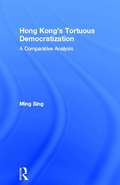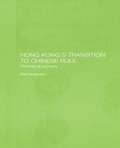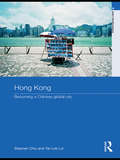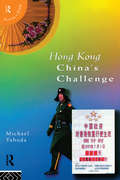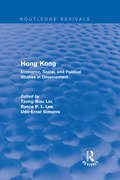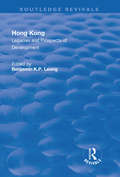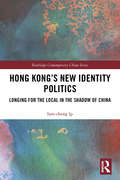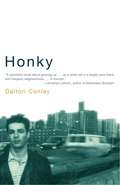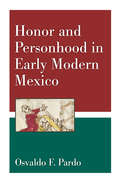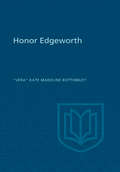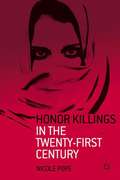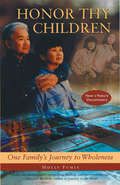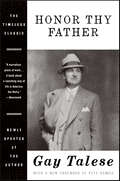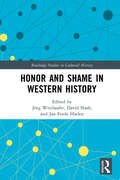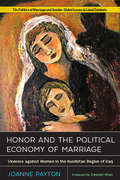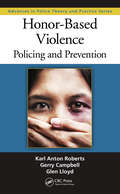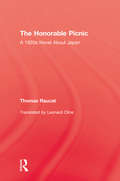- Table View
- List View
Hong Kong's Tortuous Democratization: A Comparative Analysis (Routledge Contemporary China Series #Vol. 2)
by Ming SingThis book raises interesting questions about the process of democratization in Hong Kong. It asks why democracy has been so long delayed when Hong Kong's level of socio-economic development has become so high. It relates democratization in Hong Kong to wider studies of the democratization process elsewhere, and it supplements the received wisdom - that democracy was delayed because of colonial rule and by the opposition of China - with new thinking, for example, that its quasi-bureaucratic authoritarian political structure vested power in bureaucrats who refused to have top-down democratization; a politically weak civil society and a non-participant political culture that crippled bottom-up democratization; plus the division between pro-democratic civil society and political society.
Hong Kong's Transition to Chinese Rule: The Limits of Autonomy
by Ralf HorlemannFollowing the return of Hong Kong to Chinese sovereignty, it appears that the 'high degree of autonomy' promised to Hong Kong is limited in many ways. China's reservations about the development of democracy in Hong Kong lies at the heart of the problem. The conceptual inadequacies set out in the Basic Law, Hong Kong's mini-constitution, show a correlation between a lack of democracy and a loss of autonomy. This book argues that genuine autonomy from the central government in Beijing is impossible without a democratic system in Hong Kong. Developments since the handover have, however, demonstrated that democratic trends have been halted and even reversed and that democracy is not likely to be established in Hong Kong in the near future.
Hong Kong, China: Learning to belong to a nation (Routledge Contemporary China Series #10)
by Gordon Mathews Tai-Lok Lui Eric MaThe idea of ‘national identity’ is an ambiguous one for Hong Kong. Returned to the national embrace of China on 1 July 1997 after 150 years as a British colony, the concept of national identity and what it means to "belong to a nation" is a matter of great tension and contestation in Hong Kong. Written by three academic specialists on Hong Kong cultural identity, social history, and mass media, this book explores the processes through which the people of Hong Kong are "learning to belong to a nation" by examining their relationship with the Chinese nation and state in the recent past, present, and future. It considers the complex meanings of and debates over national identity in Hong Kong over the past fifty years and especially during the last decade following Hong Kong’s return to China. It also places these arguments within a larger, global perspective, to ask what Hong Kong can teach us about national identity and its potential transformations. Multidisciplinary in its approach, Hong Kong and China explores national identity in terms of theory, mass media, survey date, ethnography and history, and will appeal to students and scholars of Chinese history, cultural studies, and nationalism.
Hong Kong: Anthropological Essays on a Chinese Metropolis (Anthropology of Asia #Vol. 99)
by Grant Evans Maria TamHong Kong has become a by-word for all that is modern and sparkling in Asia today.Yet tourist brochures still play with the old cliche of Hong Kong as a place where 'East meets West'. Images of so-called 'traditional' China, junks sailing Victoria Harbour or old women praying to gods in smoky temples, mingle with those portraying Hong Kong as a consumer and business paradise.This collection of essays attempts to transcend the old polarities. It looks at modern Hong Kong in all its splendour and diversity in the run-up to its re-absorption into Greater China in mid-97, through the mediums of film, food, architecture, rumours and slang.It explores the question of a distinct, modern Chinese identity in Hong Kong, and even when it explores the traditional stamping ground of the older anthropology in the New Territories it finds a dramatically changed context, in particular for women.This collection presents an intriguing insight into the process of transition from 'tradition' to 'modernity' in this Modern Chinese Metropolis.
Hong Kong: Becoming a Chinese Global City (Asia's Transformations/Asia's Great Cities #10)
by Tai-Lok Lui Stephen ChiuHong Kong is a small city with a big reputation. As mainland China has become an 'economic powerhouse' Hong Kong has taken a route of development of its own, flourishing as an entrepot and a centre of commerce and finance for Chinese business, then as an industrial city and subsequently a regional and international financial centre. This volume examines the developmental history of Hong Kong, focusing on its rise to the status of a Chinese global city in the world economy. Chiu and Lui's analysis is distinct in its perspective of the development as an integrated process involving economic, political and social dimensions, and as such this insightful and original book will be a core text on Hong Kong society for students.
Hong Kong: China's Challenge (Politics in Asia)
by Michael YahudaThe return of Hong Kong to China in July 1997 has the potential to benefit China's rapidly expanding economy. China's handling of the transition will have enormous implications for her international standing. This is the first study to analyse the serious problems and real opportunities that the return of the colony poses to China's international status.Examining the relationships between Greater China, Hong Kong and the West, Hong Kong: China's Challenge explores the challenges that Chinese policy makers face up to 1997 and beyond: the clash of political cultures; handling problematic negotiations; dealing with conflicting economic interests. The book concludes by suggesting that a laissez faire approach to the lucrative Hong Kong markets will ensure that China harnesses the full political and economic benefits of sovereignty over the colony.
Hong Kong: Economic, Social, and Political Studies in Development, with a Comprehensive Bibliography (Routledge Revivals)
by Lily Xiao Lee Tzong-Biau Lin Udo Ernst SimonisThis title was first published in 1979: Hong Kong's successful transformation from traditional entrepot economy into a major industrial city-state and an important financial centre in the fr East has often been acclaimed as one of the 'economic miracles' in the history of the modern world. Within the thirty years, the per capita income has increased about 13 times (reaching nearly US $ 3,000 in 1978) and ranked third in the entire Far East region, second only to Japan and Singapore, while Hong Kong's total exports multiplied 11 times ranking 20th in the whole world. in A collection of essays exploring the economic growth and structural change, including features if the Chinese family; population and housing problems; a study of material gains and impact on life-satisfaction.
Hong Kong: Legacies and Prospects of Development
by Benjamin K.P. LeungThis title was first published in 2003. Hong Kong is a society of contrasts and paradoxes. The city has a contrasting and yet fluid intermingling of social and cultural images - east and west, local and colonial, modern and traditional, extravagant and frugal. In this volume, the editor has selected essays dealing with a variety of aspects of Hong Kong including change and development, culture and identity, trends in political development, economy and society, social issues and social policy.
Hong Kong’s New Identity Politics: Longing for the Local in the Shadow of China (Routledge Contemporary China Series)
by Iam-chong IpIp uses Hong Kong as a case study in how the production of the desire for "the local" lies at the heart of global cultural economy. Perhaps more so than most places, the construction of a local identity in Hong Kong has come about through a complex interplay of neoliberalism, postcoloniality and reaction to the consequent anxieties and uncertainties. As its importance as an economic centre has diminished and its relationship with Mainland China has become more strained, its people have become more concerned to define a "Hong Kong" identity that can be defended from external threat. Ip analyses the working and reworking of power relations and modes of agency in this global city. A must read for scholars of Hong Kong politics and society as well as a fascinating case study for scholars of identity politics as a global phenomenon.
Honky
by Dalton ConleyThe author recalls how his childhood had all of the classic elements of growing up in America. His entertaining memoir as child, teenager and adult reveals how race and class impact all of us.
Honor And Personhood In Early Modern Mexico
by Osvaldo F. PardoOsvaldo F. Pardo examines the early dissemination of European views on law and justice among Mexico s native peoples. Newly arrived from Spain in the sixteenth and seventeenth centuries, mendicant friars brought not only their faith in the authority of the Catholic Church but also their reverence of the monarchy. Drawing on a rich range of documents dating from this era including secular and ecclesiastical legislation, legal and religious treatises, bilingual catechisms, grammars on indigenous languages, historical accounts, and official reports and correspondence Pardo finds that honor, as well as related notions such as reputation, came to play a central role in shaping the lives and social relations of colonists and indigenous Mexicans alike. Following the application and adaptation of European ideas of justice and royal and religious power as they took hold in the New World, Pardo sheds light on the formation of colonial legalities and long-lasting views, both secular and sacred, that still inform attitudes toward authority in contemporary Mexican society. "
Honor And Violence Against Women In Iraqi Kurdistan
by Minoo AliniaThis book examines violence against women in the name of honor in Iraqi Kurdistan, taking an intersectional perspective. It reveals the links between destructive, state-sanctioned honor discourse and notions of manhood as they are shaped by a resistance culture dedicated to the struggle against ethnic oppression.
Honor Edgeworth
by Douglas Lochhead Kate Madeleine BottomleyIn Honor Edgeworth the sole and sincere motive of the authoress has been to hold up to the mass the little picture of society, in one of its most marked phases, that she has sketched, as she watched its freaks and caprices from behind the scenes.Ottawa, in this work, is taken merely as a representative of all other fashionable cities, for the simple reason that it is better known to the writer than any other city of social repute. Her object in publishing the volume at all, if not clearly defined throughout the work, may be discovered here: it is primarily, to attract the attention of those who, if they wished, could exercise a beneficial influence over the sphere in which they live, to the moral depravities that at present are allowed so passively to float on the surface of the social tide. It would with the same word appeal to the minds and hearts of those women who are satisfied to remain slaves to the exactions of an unscrupulous society, at the sacrifice of their most womanly impulses, and their noblest energies; and would also remind some reckless sons of Ottawa, of how miserably they are contributing towards the future prosperity of their country, by adopting, as the only aim of their lives, the paltry ambition of an unworthy self-indulgence.The predominant feeling throughout the entire composition has been one of pure philanthropy, as the authoress desires to benefit her fellow-creatures, in as far as it lies in her very limited power.
Honor Killing
by David E. StannardIn the fall of 1931, Thalia Massie, the bored, aristocratic wife of a young naval officer stationed in Honolulu, accused six nonwhite islanders of gang rape. The ensuing trial let loose a storm of racial and sexual hysteria, but the case against the suspects was scant and the trial ended in a hung jury. Outraged, Thalia’s socialite mother arranged the kidnapping and murder of one of the suspects. In the spectacularly publicized trial that followed, Clarence Darrow came to Hawai’i to defend Thalia’s mother, a sorry epitaph to a noble career. It is one of the most sensational criminal cases in American History, Stannard has rendered more than a lurid tale. One hundred and fifty years of oppression came to a head in those sweltering courtrooms. In the face of overwhelming intimidation from a cabal of corrupt military leaders and businessmen, various people involved with the case—the judge, the defense team, the jurors, a newspaper editor, and the accused themselves—refused to be cowed. Their moral courage united the disparate elements of the non-white community and galvanized Hawai’i’s rapid transformation from an oppressive white-run oligarchy to the harmonic, multicultural American state it became. Honor Killing is a great true crime story worthy of Dominick Dunne—both a sensational read and an important work of social history .
Honor Killings in the Twenty-First Century
by Nicole PopeThousands of women are murdered every year by close relatives for allegedly violating an unwritten social code or rebelling against the patriarchal order. The book examines the roots and evolution of honor-based violence, as well as the ongoing struggle to eradicate it worldwide.
Honor Thy Children: One Family's Journey to Wholeness
by Molly FumiaExperience this gripping true story of a Japanese American family’s transformation from brokenness to wholeness in the face of tragedy.The inspirational account of a Japanese-American family’s triumph after grappling with the death of their three children—two from AIDS and a third the victim of a tragic drive-by shooting—Honor Thy Children chronicles the creation, devastation, and remarkable resurrection of the Nakatanis, who journey from unimaginable grief to healing.Praise for Honor Thy Children“This is a story that will break your heart and make it whole again. It will bring you into a realm of humanness and compassion you didn’t know you had. It might even set you free to love in ways you’ve never loved before.” —Sister Helen Prejean, #1 New York Times-bestselling author of Dead Man Walking“I have never read such a powerful story about a Japanese American family like this before. It relates a universal message of the deep love the Nakatanis have for their children which transcended alienation and despair…. It is the Nakatanis enduring legacy of love and hope to the world.” —Ford H. Kuramoto, national director, National Asian Pacific American Families Against Substance Abuse
Honor Thy Father
by Gay TaleseA classic masterwork newly updatedThe electrifying true story of the rise and fall of New York's notorious Bonanno crime familyOn New York's Park Avenue on a rainy Tuesday night in October 1964, the famous Mafia chieftain Joseph Bonanno was kidnapped by two mobsters and reported by the police as dead on the following morning. More than a year later, Bonanno mysteriously reappeared, setting off a bloody mob feud that came to be known as the “Banana War.”In this monumental work—packed with intimate details and brilliant reporting—bestselling author Gay Talese first brought to the American consciousness a world and a life previously known to only a few. No other book has done more to acquaint readers with the secrets, structure, wars, power plays, family lives, and fascinating, frightening personalities of the Mafia.
Honor and Revenge: A Theory of Punishment
by Whitley R.P. KaufmanThis book addresses the problem of justifying the institution of criminal punishment. It examines the "paradox of retribution": the fact that we cannot seem to reject the intuition that punishment is morally required, and yet we cannot (even after two thousand years of philosophical debate) find a morally legitimate basis for inflicting harm on wrongdoers. The book comes at a time when a new "abolitionist" movement has arisen, a movement that argues that we should give up the search for justification and accept that punishment is morally unjustifiable and should be discontinued immediately. This book, however, proposes a new approach to the retributive theory of punishment, arguing that it should be understood in its traditional formulation that has been long forgotten or dismissed: that punishment is essentially a defense of the honor of the victim. Properly understood, this can give us the possibility of a legitimate moral justification for the institution of punishment.
Honor and Shame in Western History (Routledge Studies in Cultural History)
by David Nash Jörg Wettlaufer Jan Frode HatlenThis book covers a wide range of topics related to honor and shame in European historical societies: history of law and literature, social and ancient history, as well as theoretical contributions on the state of research and the importance of honor and shame in traditional societies. Honor and shame in Western History brings together 14 texts of interdisciplinary scholars from Europe and North America. It covers a wide range of topics related to honor and shame in historical societies. The contributions cover periods of Western history from Greek and Roman times to the nineteenth century and many of them integrate the concept of a "deep history" of honor and shame in social interaction. The book is essential for a broad audience interested in social history and the history of emotions.
Honor and Violence in the Old South
by Bertram Wyatt-BrownHailed as a classic by reviewers and historians, Bertram Wyatt-Brown's Southern Honor now appears in abridged form under the title Honor and Violence in the Old South. <p><p>The first major reinterpretation of southern life and custom since W.J. Cash's The Mind of the South, this work explores the meaning and expression of the ancient code of honor as whites—both slaveholders and non-slaveholders—applied it to their lives. Wyatt-Brown argues persuasively that southern ethical habits and traditions are the basis of regional distinctiveness and helped to justify the South's most cherished peculiarity: the institution of slavery. <p><p>Using both literature and anthropology in innovative ways, he shows how honor affected family loyalty and community defensiveness. The work begins with a study of Hawthorne's famous story of a tar-and-feathering, "My Kinsman, Major Molineux," and it ends with an authentic lynching, an absorbing and chilling example of a public shaming ritual. Between these studies of fictional and historical violence, Wyatt-Brown deals with such wide-ranging topics as childbearing, marital patterns, gentility, legal traditions, duelling, hospitality, slave discipline, lynch-law, and insurrectionary panic-all of which gave white southerners a special sense of themselves. Book jacket.
Honor and the Political Economy of Marriage: Violence against Women in the Kurdistan Region of Iraq (Politics of Marriage and Gender, Global)
by Joanne Payton'Honor' is used as a justification for violence perpetrated against women and girls considered to have violated social taboos related to sexual behavior. Several ‘honor’-based murders of Kurdish women, such as Fadime Sahindal, Banaz Mahmod and Du’a Khalil Aswad, and campaigns against 'honor'-based violence by Kurdish feminists have drawn international attention to this phenomenon within Kurdish communities. Honor and the Political Economy of Marriage provides a description of ‘honor’-based violence that focuses upon the structure of the family rather than the perpetrator’s culture. The author, Joanne Payton, argues that within societies primarily organized by familial and marital connections, women’s ‘honor’ is a form of symbolic capital within a ‘political economy’ in which marriage organizes intergroup connections. Drawing on statistical analysis of original data contextualized with historical and anthropological readings, Payton explores forms of marriage and their relationship to ‘honor’, sketching changing norms around the familial control of women from agrarian/pastoral roots to the contemporary era.
Honor, Status, and Law in Modern Latin America
by Sueann Caulfield Sarah C. Chambers Lara PutnamThis collection brings together recent scholarship that examines how understandings of honor changed in Latin America between political independence in the early nineteenth century and the rise of nationalist challenges to liberalism in the 1930s. These rich historical case studies reveal the uneven processes through which ideas of honor and status came to depend more on achievements such as education and employment and less on the birthright privileges that were the mainstays of honor during the colonial period. Whether considering court battles over lost virginity or police conflicts with prostitutes, vagrants, and the poor over public decorum, the contributors illuminate shifting ideas about public and private spheres, changing conceptions of race, the growing intervention of the state in defining and arbitrating individual reputations, and the enduring role of patriarchy in apportioning both honor and legal rights. Each essay examines honor in the context of specific historical processes, including early republican nation-building in Peru; the transformation in Mexican villages of the cargo system, by which men rose in rank through service to the community; the abolition of slavery in Rio de Janeiro; the growth of local commerce and shifts in women's status in highland Bolivia; the formation of a multiethnic society on Costa Rica's Caribbean coast; and the development of nationalist cultural responses to U. S. colonialism in Puerto Rico. By connecting liberal projects that aimed to modernize law and society with popular understandings of honor and status, this volume sheds new light on broad changes and continuities in Latin America over the course of the long nineteenth century. Contributors. Jos Amador de Jesus, Rossana Barragn, Sueann Caulfield, Sidney Chalhoub, Sarah C. Chambers, Eileen J. Findley, Brodwyn Fischer, Olvia Maria Gomes da Cunha, Laura Gotkowitz, Keila Grinberg, Peter Guardino, Cristiana Schettini Pereira, Lara Elizabeth Putnam
Honor, Vengeance, and Social Trouble: Pardon Letters in the Burgundian Low Countries
by Walter Prevenier Peter ArnadeAmong the more intriguing documentary sources from late medieval Europe are pardon letters--petitions sent by those condemned for serious crimes to monarchs and princes in France and the Low Countries in the hopes of receiving a full pardon. The fifteenth-century Burgundian Low Countries and duchy of Burgundy produced a large cache of these petitions, from both major cities (Bruges, Ghent, Antwerp, and Dijon) and rural communities. In Honor, Vengeance, and Social Trouble, Peter Arnade and Walter Prevenier present the first study in English of these letters to explore and interrogate the boundaries between these sources' internal, discursive properties and the social world beyond the written text.Honor, Vengeance, and Social Trouble takes the reader out onto the streets and into the taverns, homes, and workplaces of the Burgundian territories, charting the most pressing social concerns of the day: everything from family disputes and vendettas to marital infidelity and property conflicts--and, more generally, the problems of public violence, abduction and rape, and the role of honor and revenge in adjudicating disputes. Arnade and Prevenier examine why the right to pardon was often enacted by the Burgundian dukes and how it came to compete with more traditional legal means of resolving disputes. In addition, they consider the pardon letter as a historical source, highlighting the limitations and pitfalls of relying on documents that are, by their very nature, narratives shaped by the petitioner to seek a favored outcome. The book also includes a detailed case study of a female actress turned prostitute. An example of microhistory at its best, Honor, Vengeance, and Social Trouble will challenge scholars while being accessible to students in courses on medieval and early modern Europe or on historiography.
Honor-Based Violence: Policing and Prevention (Advances in Police Theory and Practice)
by Karl Anton Roberts Gerry Campbell Glen LloydHonor-based violence (HBV) is a crime committed to protect or defend the honor of a family and/or a community. It is usually triggered by the victim‘s behavior, which the family and/or community regards as causing offense or dishonor. HBV has existed for thousands of years but has only very recently become a focus of law enforcement, policy makers,
Honorable Picnic: A 1920s Novel About Japan
by RaucatFirst published in 2010. Routledge is an imprint of Taylor & Francis, an informa company.
